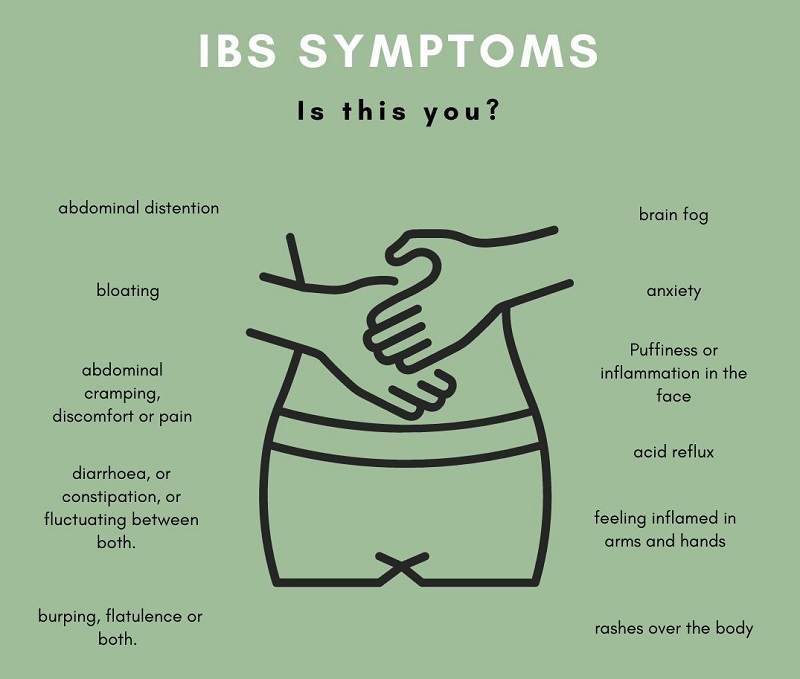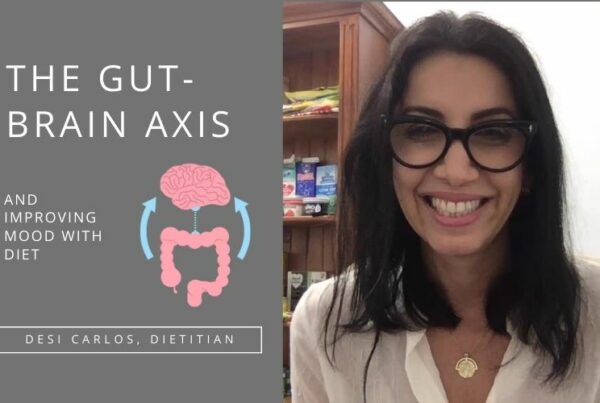Irritable Bowel Syndrome (IBS)
Do you have symptoms of irritable bowel syndrome (IBS)? You may have bloating, pain, changes in bowel motions, urgency or excess wind? Perhaps you’re experiencing fatigue, reflux, anxiety, brain fog or an inability to lose weight? As an experienced irritable bowel syndrome dietitian, Desi understands these symptoms can be really painful, embarrassing and difficult to manage. You might have been living with irritable bowel syndrome for a while now. Perhaps you’ve eliminated gluten, or dairy, or been following a FODMAPs diet for months? And while you’ve been doing “all the things” they say can make it better, you’re still suffering. Maybe you feel that deep down there must be something else going on? Something you’ve missed? But no one can give you a straight answer.

Well, your “GUT” instincts are right.
After treating thousands of IBS patients in our clinic, we have found that many people share a common issue, an unhealthy gut microbiome. This is often not investigated early enough when it comes to IBS (or any condition really). Common dietary treatments for IBS that eliminate food groups aren’t long term solutions. They only lead to ongoing or escalated gut issues when the gut is already out of balance. So the whole condition just gets more difficult over time. If this sounds familiar to you, you’re probably in a place right now where your poor body is crying out for help. Either to escape the pain, stop the embarrassment or just so you can feel like your old self again. With expert help we can work with you to find solutions to:

Work with an irritable bowel syndrome dietitian in Brisbane to uncover the answers.
Firstly, we want to tell you, you are not alone. We understand the embarrassment, pain and frustration you probably experience every day. Irritable bowel syndrome is regarded as a long-term condition, but we want to challenge that thinking! Tree of Life Nutrition have been specialists in gut health issues since 1993, We work with patients who have a range of symptoms from mild to debilitating, to give them back a quality of life they thought was lost.
And it’s not just abdominal symptoms that our IBS protocol can alleviate. By working with an irritable bowel syndrome dietitian to restore your gut health, you’ll probably see improvements in how you feel mentally, with renewed energy and reduced inflammation. Or even start to lose weight if you’ve been struggling to. That’s because fixing the gut fixes the whole body. It really is the centre of our universe.
Over the years we have helped many people successfully ease their IBS symptoms. There’s no one right answer for every person. It can sometimes take some real detective work to get there. But you are worth the effort.
How common is irritable bowel syndrome?
Irritable bowel syndrome (IBS) is a condition impacting the large bowel. It presents as a group of symptoms relating to digestive discomfort. Some people also term IBS as leaky gut or intestinal permeability. They’re a little bit different; but ultimately, the symptoms are the same. Up to 30% of Australians have irritable bowel syndrome, and it’s more common in women than in men.
Why do I have IBS?
You might feel frustrated that no one can give you a definitive answer on this. You may assume you just have to put up with your symptoms indefinitely. However, over the years working with thousands of IBS patients in the clinic, we have been able to pinpoint key areas for understanding what has triggered your condition. Your irritable bowel syndrome dietitian will take you through our IBS protocol systematically, giving you the best possible chance at improving your wellbeing. It starts with gut health rebalancing, which often makes a huge difference to IBS symptoms.
What is a leaky gut?
Leaky gut is a term used to describe a condition called intestinal permeability. This is different from IBS, although it can play a role in creating IBS symptoms. Leaky gut is where the lining of the gut develops large cracks or holes. This allows leakage of food, toxins and bacteria into the tissue behind. This can lead to inflammation and can also tip the balance of the gut microbiome where there is more harmful bacteria in the gut. The way we treat leaky gut here at Tree of Life Nutrition, is not through restriction of diet. There are two parts to fixing leaky gut. Fixing the structure, as well as what is inside that structure. So we work towards re-establishing a strong barrier, as well as rebalancing the microbiome.
What are FODMAPs and are they causing my IBS?
FODMAP stands for Fermentable Oligosaccharides Disaccharides Monosaccharides and Polyols. FODMAPs are a group of short-chain carbohydrates (sugars) found naturally in food, as well as in additives. Studies from Monash University show that these short-chain carbohydrates have been found to trigger symptoms of IBS. There is a standardised FODMAPs dietary protocol which has been tested and trialled by Monash. This forms the diet that we use as FODMAPs accredited and trained specialists.
Many people who first get a diagnosis of irritable bowel syndrome are directed straight to a low FODMAPs diet. And while FODMAP sensitivity can be the reason for IBS, we’d argue you cannot be sure you have a true food intolerance until we have ruled out dysbiosis, or other gut-related conditions. In fact, a FODMAPs diet can often make the gut microbiome (and therefore symptoms) worse. So we ensure that when you begin a low FODMAP diet, you’re not following it longer than 4 weeks. So if you’ve been stuck on FODMAPs for longer than that, or if you’ve found a worsening of symptoms over time, this may be the reason. With that in mind, we offer a robust FODMAP protocol for IBS sufferers designed to restore balance, and help you uncover the answers easily and safely. This could include FODMAPs diet, but it doesn’t begin there.
What symptoms indicate IBS?
- Distended abdomen
- Abdominal bloating
- Pain or discomfort ranging from mild to severe
- Burping, flatulence or both
- Diarrhoea (ranging from mild to severe) or constipation or fluctuating between both; as well as these secondary symptoms:
- Gastroesophageal acid reflux
- Brain fog
- Fatigue
- Anxiety
- Rashes over the body
- Feeling inflamed in arms and hands
- Puffiness or inflammation in the face
What causes an imbalance in the gut?
Every person’s gut has both good and bad bacteria present, as well as yeast. This is called the microbiome. This community of bacteria is formed before we are born, and is then impacted by our birth, and a whole range of things after. From whether we are breastfed, to the food we eat. The balance of good and bad bacteria is responsible for how healthy we feel. Negative changes in the gut, as well as the introduction of bad bacteria can cause gut dysbiosis, or an imbalance of bad bacteria.
Gut dysbiosis can be caused by a whole range of things. From the medications we take (such as antibiotics or anti-inflammatories) to foods that we eat (that may introduce additional chemicals, or that are low in nutrients, starving our good gut bacteria). It can also be caused by things like too much alcohol, stress, trauma or viruses. You can imagine in our modern world it’s hard to avoid gut dysbiosis at one time or another. What we do know is that gut dysbiosis is linked to IBS and many other bowel conditions. See more about our Gut Relief Program, here at Tree of Life Nutrition to help restore microbiome balance.
What is SIBO?
SIBO stands for Small Intestine Bacterial Overgrowth. As the name suggests, the condition is present when there are excessive amounts of bacteria present in the lower intestine. This condition also produces IBS-like symptoms. As well, it can make you malnourished, with fatigue and weight loss. This is because the nutrients you need from food are being used up by the competing bacteria. Unlike IBS, which is a set of symptoms rather than a single cause, SIBO can be diagnosed with a test. You may have heard about it in relation to IBS, because the two conditions are sometimes present together. In fact, if you have IBS, you are more likely to test positive for SIBO, and it is now considered a leading cause. Antibiotics are considered the first port of call, but it is widely regarded that dietary management (and restoration of gut microbiota) is crucial to prevent recurrence. At Tree of Life Nutrition, we always ensure you are tested for SIBO, and if positive, can offer you some robust dietary protocols to help restore the good bacteria, and optimise your nutritional status.
Our IBS dietary treatment protocol
There are many intricacies to exactly how we get results, but broadly, these are the steps your Tree of Life irritable bowel syndrome dietitian we take to lead you back to better health.
1. Rebalance gut health
Our point of difference here at Tree of Life Nutrition is focusing on the gut as the centre of your health. Your microbiome is incredibly important to your wellbeing, from your head to your toes! So when treating irritable bowel syndrome, our first port of call is to examine your gut microbiome, and uncover and correct imbalance (gut dysbiosis). Tree of Life Nutrition’s IBS dietitians can utilise microbiome testing if required. We also work with you to understand any possible reason for dysbiosis that can be eliminated from your life.
2. Rule out underlying causes
When it comes to uncovering the cause of IBS symptoms, we leave no stone unturned. We take your family, social and medical history. As well as your pathology, bowel x-rays, scope and biopsy results and microba or microbiome testing. This investigative stage helps us identify and rule out possible issues. This might include nutritional deficiencies, inflammation, allergies, Inflammatory Bowel Disease and more. Taking the time to uncover your history and run these tests not only helps us get a more complete picture of the cause, but create a more effective solution.
3. Examine possible food intolerance
Many patients actually see improved results after we rebalance their microbiome, and often don’t need to undergo diagnosis for food intolerance. However, if symptoms are still present then examining food intolerance is our next step. This process is made easier and has better results when the gut is in balance.
Diagnosis for food intolerance is through an elimination diet. We always recommend working with a dietitian to do this. The quickest way to help recognise symptoms and speed up the process of understanding what’s affecting you is via supervision from someone trained in the field. Our IBS specialist dietitians are FODMAP Accredited and Trained (Monash University). FODMAP intolerance diagnosis is through undergoing supervision of partial or full FODMAPs diet, and food elimination if required.
When working with food intolerance, our job is a bit like a food detective, trying to understand which diet or which food is most relevant to the condition. Rest assured, we don’t give up easily, and most times, we will find the culprit flaring up your IBS symptoms. Along the way, we’re here to make the process as easy as possible without restriction. This ensures your newly restored microbiome is not impacted.

The Mediterranean Diet for IBS
We use the tried and tested principles of the Mediterranean Diet as the best diet for IBS. The Mediterranean Diet is the only lifestyle eating regime that helps enhance the gut microbiome and reduces inflammation. It is naturally high in fibre, which is important for good gut health. It is also low in fat, abundant in good fats and is highly nutritious with a high plant-based component. And in our experience it’s the kind of food people want to eat, because it’s also tasty. If you are open to a new and exciting diet with foods you may never have tried before, we’d love to share our heritage as Greek-Australians with you. We know how to shop, eat, cook and live the Mediterranean way, and that’s not just a bunch of recipes or a diet, that’s a whole lifestyle. We create meal plans for you, and give you the real deal on how to be healthy and enjoy food at the same time.
But this isn’t about turning you into a Mediterranean or forcing you to eat like us. What we’re talking about here, is applying the principles of this diet to your culture and tastes. What’s most important is that it’s good food and you enjoy what you’re eating. We are foodies at heart! So if you hate feta cheese, or prefer Asian food, that’s totally fine with us. What we do is apply the components of the Mediterranean Diet to create a hybrid that’s as individual as you are. We can also adapt a standard Mediterranean Diet to be low FODMAPs or to include other intolerances we may have uncovered.
Let us help you recover a better quality of life
We know IBS feels like it’s never going to go away. It can be easy to give up hope. It’s our promise to you that we will work hard to find your solution. As one of Brisbane’s first dietitians in private practice operating since 1993, Desi Carlos and the team at Tree of Life Nutrition can offer you years of experience in IBS dietary treatment. We bring that wealth of knowledge to your case, giving you every possible chance to reduce your symptoms, and live your best life.
Grab a sample of free tummy-loving recipes for better gut health
Want some easy and tasty recipes for good gut health? Download our free recipe eBook
Read some of our articles about gut health and IBS



